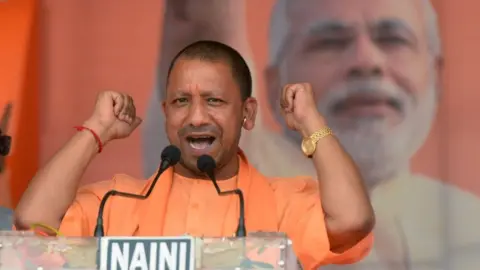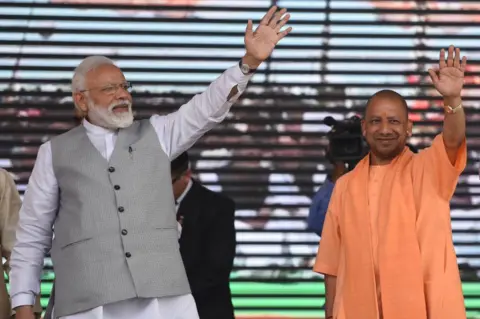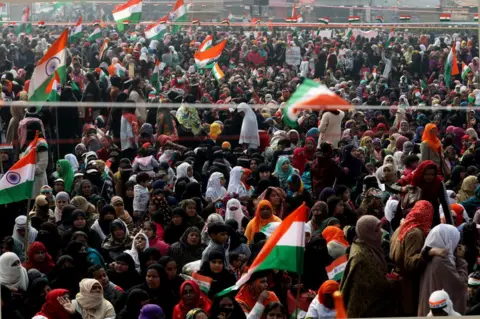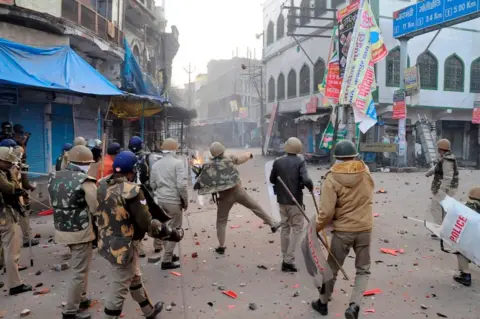Yogi Adityanath: 'Muslims did no favour to India by staying here'
 Getty Images
Getty ImagesMuslims who chose to stay in India when it was partitioned following independence from Britain did the country "no favours", Yogi Adityanath, one of India's most controversial right-wing politicians, has said.
"They should have opposed partition, which led to the formation of Pakistan," he told BBC Hindi's Nitin Srivastava in an exclusive interview.
Mr Adityanath is the chief minister of the northern state of Uttar Pradesh, India's most populous state and home to nearly a quarter of India's 200 million Muslims. He is also a top leader in the governing Bharatiya Janata Party, led by Prime Minister Narendra Modi.
His government has recently been accused of using excessive force against protesters, especially Muslims, opposing a contentious new citizenship law. But Mr Adityanath has denied these widespread allegations, even though they have been backed by compelling evidence.
The 47-year-old, saffron-robed, head priest of an influential Hindu temple is no stranger to controversy - he has made headlines for his hardline rhetoric, often directed against Muslims.
His comments appear to have intensified amid anti-government protests spurred by the citizenship law, known as the Citizenship Amendment Act (CAA).
 Getty Images
Getty ImagesIt offers amnesty to non-Muslim illegal immigrants from Pakistan, Bangladesh and Afghanistan. It has been criticised for targeting Muslims, but Mr Modi's government insists it does no such thing, and only seeks to indentify unauthorised immigrants.
But the law sparked massive protests in December, including large sit-in demonstrations, some of which are still continuing. The most notable of these is in Delhi's Shaheen Bagh, where hundreds of Muslim women have been camped out in protest for more than a month now.
In a veiled reference to the protesters in Shaheen Bagh, the chief minister told the BBC: "Men of a particular community, who are cowards, are sitting in their quilts and sending women and children out of their homes to protest against this law."
While accepting that "everyone has the right to peacefully protest in India", he claimed that the protest in Shaheen Bagh was "not peaceful, and was causing trouble to commuters and residents".
The protest has been peaceful, but its location on one of Delhi's biggest roads has led to traffic snarls, although demonstrators allow emergency vehicles to pass through.
But this is not the first time Mr Adiyanath has spoken out against the protests in Shaheen Bagh.
During the interview, he repeated an accusation he has levelled against Arvind Kejriwal, the chief minister of the national capital, Delhi: that he "feeds hundreds of protesting women and children biryani", a popular rice-based dish that's associated with Muslim cuisine.
 Getty Images
Getty ImagesThis is a claim he has made while campaigning for this Saturday's state election in Delhi, where he has invoked "Hindu nationalistic pride", while ridiculing neighbouring Pakistan.
Mr Kejrwal, a fierce critic of the BJP and Mr Modi, is up for re-election. His party won an emphatic victory in 2015, defeating all opposition, including the BJP.
"We aren't the biryani-eating people", Mr Adityanath has said on the campaign trail, adding that after becoming PM, Mr Modi has been "shooting terrorists with bullets rather than giving them biryani."
He told the BBC he stood by this statement.
The protests against the CAA saw hundreds injured, and many even died amid violent clashes with police. And protesters often accused the police of using excessive force against them.
Nowhere have the allegations been more serious than in Mr Adityanath's Uttar Pradesh, where at least 19 people died in the protests.
There have been numerous of reports of intimidation and threats against Muslims - videos from Kanpur city show policemen allegedly vandalising cars and homes in Muslim-populated areas. Thousands, mostly Muslim men, were detained across the state. The BBC reported on similar incidents in other cities.
Mr Adityanath justified the firing against "violent protesters", while denying allegations of police using force against peaceful protesters. He said, "armed, rampaging mobs were dealt with by the police when they started damaging public property".
 Getty Images
Getty ImagesAsked if he would order action against protesters again, he said, "Yes, if they damage public property in the garb of opposing a law, which is non-discriminatory."
His government has also been accused of a series of extra-judicial killings since Mr Adityanath came to power in March 2017 - a charge he denied.
"There have been no [such] killings", he said. "People opposing me have been spreading false rumours but my administration is running superbly. The truth will be out soon."
